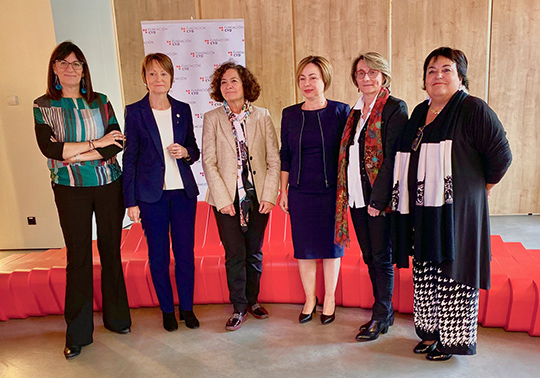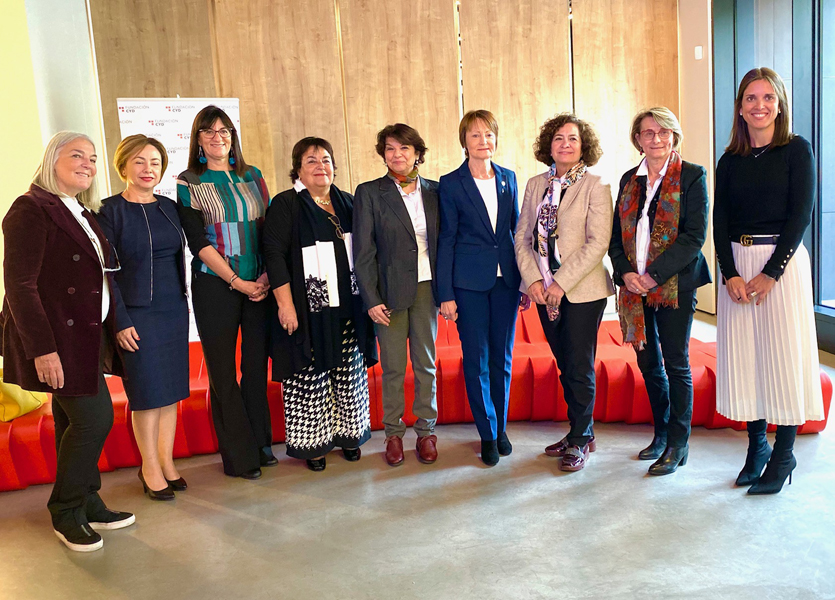The Principal Maria Vicenta Mestre debates about women’s leadership at university
- Office of the Principal
- November 20th, 2019

The CYD Foundation, in collaboration with Mujeres&Cía, organized on Wednesday 20th November, a debate entitled El liderazgo de la mujer en la universidad (Women's leadership in the university) in which six Principals of Spanish public universities have participated.
The Principal of the Universitat de València, Maria Vicenta Mestre, was present at the debate El liderazgo de la mujer en la universidad (Women's leadership in the university) organised by the CYD Foundation in the Havas Village auditorium in Madrid. Along with Mestre, the Principal of the Universitat Jaume I, Eva Alcón; the Principal of the University of La Laguna, Rosa Aguilar; the Principal of the University of Granada, Pilar Aranda; the Principal of the Rovira i Virgili University, María José Figueres; and the Principal of the University of Huelva, María Antonia Peña have participated. In total, seven of the nine women who currently run Spanish public universities. Currently, adding private academic institutions, only 15 of Spain's 83 universities have women at the head of their Rectorates.
The debate has dealt with the causes and consequences behind the gender gap that currently exists in the academic pyramid. This initiative has been introduced by the director of the CYD Foundation, Sónia Martínez, and has been moderated by the journalist Mercedes Wullich, founder of Mujeres & Cia and of the ranking The Top 100 Latin Women in Spain, initiatives that aim to give visibility in the world of politics, economy and society to women.
The session was opened by the acting Secretary of State for Equality, Soledad Murillo, who backed the importance of strengthening women's leadership in the university sphere and said that 'being the Principal is a real challenge. The university can and has feminine talent'.
In her turn, the Principal of the Universitat de València, Maria Vicenta Mestre said that 'women are required to fulfil different roles that society has marked us, and that are unequal in terms of gender. Therefore, if a woman deals with raising a child by herself or has dependents of her care, there is a gap between men and women in their opportunities.
The Principal of the Universitat Jaume I Eva Alcón has highlighted that 'the road is harder for women, who are socially assumed to have a greater burden of family tasks'.
Rosa Aguilar has remembered her experience as a computer scientist to assert that the gender gap is evident in the STEM (Science, Technology, Engineering and Mathematics) areas 'hence the significance of encouraging women to study these fields of knowledge,' said the Principal of La Laguna.
Why don't women run for office? Because to do that you have to take the step to introduce yourself, you have to know and therefore it is necessary that the work is visible. And the work of women does not become visible,' said Pilar Aranda, principal of the University of Granada.
On the other hand, the rector of the Rovira i Virgili University María José Figueres has recalled that 'in public universities 12% of Principals are women, while in private universities there is a 27%. It happens that in an elective system in which the requirement to be a university professor has to be met, there are far fewer women than men’.
María Antonia Peña, Principal of the University of Huelva has remarked that 'in questions of equality we are talking about a problem with deep cultural roots that can be seen in the university as well as in our society'.
The event was also attended by some of the participants in the debate, such as the director of the Spanish Foundation for Science and Technology (FECYT), Paloma Domingo, who wanted to highlight the higher level of self-demand imposed by women.
The Fundación Conocimiento y Desarrollo (CYD, Knowledge and Development Foundation) was created in 2002 with the aim of responding to a series of specific needs of Spanish universities. With this, the CYD Foundation analyses the reality of Spanish universities, such as student training, research activities and institutional proposals for the creation and transfer of knowledge, in order to promote university ideas capable of converting acquired knowledge into value, contributing to the growth and progress of the country.
File in: Institucional














